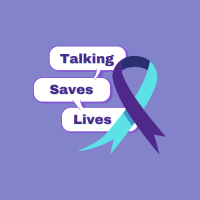11% of students reported thoughts of suicide in law school. 33% of law students reported thoughts of suicide in their lifetime. [It is Okay to Not Be Okay, The 2021 Survey of Law Student Well-Being, 2022]
If immediate help is needed: phone 911, go to the nearest hospital ER or call Crisis Line - 604 872 3311

Signs of a Mental Health Crisis
A change in behavior, feelings, or thoughts change drastically or very subtly over time.
- Lacking energy or experiencing 'brain fog'
- Feeling restless and agitated
- Sleeping too little or too much
- Feelings of hopelessness or not having a purpose
- Feeling trapped or experiencing pain from a recent loss
- Not enjoying activities they used to
- Withdrawing from social connections or talking about burdening others
- Displaying extreme mood swings
- Increased use of unhelpful coping tools such as alcohol or drugs
- Finding it hard to cope with everyday things and tasks
Tools to make you a stronger advocate for yourself and others:
Suicide Awareness Resource Book (PDF)
- This resource book works to create suicide awareness.
- Includes support resources for those who are struggling with thoughts of suicide or supporting someone in crisis.
Allard Student Wellbeing Toolkit (PDF)
- Introduction to a spectrum of mental health concerns
- Access worksheets to build coping plans and learn more about unhelpful thinking traps.
Suicide Awareness & Intervention Training (SAIT)
- UBC's custom Suicide Awareness and Intervention Training that is from a post-secondary context, is trauma-informed, and has cultural context.
- Free, introductory course for any UBC students, faculty, staff and alumni. There are no prerequisites.
UBC Wellbeing Workshops on Canvas
- Navigating Your Health and Wellbeing at UBC and Beyond
- How to Help a Peer
- Mental Health: The Basics
Assisting Students in Distress: A Guide for Faculty & Staff
- Everyone plays an important role in supporting student mental health and wellbeing. Faculty and staff can use this guide to know what to look for, say and do if they are concerned about a student.
Advocating for myself:
Three statements that can be helpful to hold onto in these moments are:
1) You're not alone in feeling this way.
2) These feelings will not last forever.
3) Help is available.
If immediate help is needed:
- Phone 911
- Go to the nearest hospital ER
- Call Crisis Line: 604 872 3311
- Car 87 (Vancouver): 604.675.3700 or 911
- Car 67 (Surrey): 604.599.0502 or 911
Additional ways to access support:
Support between 8:30 - 4:30:
- The Allard Student Wellbeing Counsellor [wellbeing@allard.ubc.ca or drop into room 147b]
- UBC Counselling Services [604-822-3811]
- Student Health Services or family doctor
24/7 Support:
- Call Crisis Line: 1.800.784.2433 or 604.872.3311
- Here2Talk: 1.877.857.3397
- Mental Health Support Line: 310.6789 (no area code)
- Aboriginal Crisis Line: 250.723.4050 or 1.800.588.5717
- Speak to a counsellor at Lawyer Assistance Program 1.888.685.2171
Advocating for my friend:
If you are worried about the wellbeing of a friend you can contact the Student Wellbeing Counsellor, who will be able to discuss about how best to support your friend, as well as how to remember your own self care. Remember that information shared with the Student Wellbeing Counsellor is confidential unless there is risk of harm.
Tips for helping someone in distress:
- Identify warning signs: changes in behaviors such as missing class, deadlines, unusual behavior, changes in appearance, or manner of speech.
- Check in: be direct, open and empathetic; listen more than you speak and focus on understanding rather than trying to fix the problem.
- Mention behaviors you observe and provide empathy: "you seem less chatty than usual, what's going on?" "that sounds really tough"
- Ask further questions: "what I'm hearing you say is...", "sounds like you are feeling.. do I have that correct?, "when you don't see the point in waking up in the morning, does that mean you're having thoughts of suicide?" "how long have you been feeling this way?"
- Respond with empathy: "thank you for sharing this with me", "I'm here for you"
- If they don't want to talk: let them know that you care about them and that you're concerned with the changes in their behavior. Encourage them to reach out when they are ready to talk.
- Connect them with supports: don't overwhelm the person [pick 2 or 3 resources and text or write it down for them to reference in the future.
- The Allard Student Wellbeing Counsellor [wellbeing@allard.ubc.ca or drop into room 147b]
- UBC Counselling Services [604-822-3811]
- Call Crisis Line: 1.800.784.2433 or 604.872.3311
- Here2Talk: 1.877.857.3397
- Mental Health Support Line: 310.6789 (no area code)
- Aboriginal Crisis Line: 250.723.4050 or 1.800.588.5717
- Speak to a counsellor at Lawyer Assistance Program 1.888.685.2171
- Practice your own self-care: having difficult conversations can take a toll on us so taking care of yourself and connecting to your own resources are important. Reminder: we are not responsible for anyone's feelings and actions.
